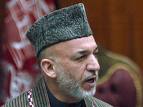Saturday
Apr172010
Afghanistan: US Overruling Afghan "Allies" for Kandahar Offensive? (Porter)
 Saturday, April 17, 2010 at 12:51
Saturday, April 17, 2010 at 12:51  Gareth Porter writes for Inter Press Service:
Gareth Porter writes for Inter Press Service:The U.S. military has now officially backtracked from its earlier suggestion that it would seek the consent of local shuras, or consultative conferences with those elders, to carry out the coming military occupation of Kandahar city and nearby districts --- contradicting a pledge by Afghan President Hamid Karzai not to carry out the operation without such consent.
Afghanistan: Misunderstanding the Society, Killing the Civilians
Lt. Col. Tadd Sholtis, a spokesman for Gen. Stanley A. McChrystal, the commander of U.S. and NATO troops in Afghanistan, told IPS Tuesday that local tribal elders in Kandahar could "shape the conditions" under which the influx of foreign troops operate during the operation, but would not determine whether or where NATO troops would be deployed in and around the city.
Asked whether the International Security Assistance Force (ISAF) is committed to getting local approval before introducing more troops into Kandahar and surrounding districts, the McChrystal spokesman said, "We're not talking about something as simple as a referendum."
At a Mar. 29 briefing in Kabul on plans for the Kandahar operation, however, an unnamed senior U.S. military official told reporters that one of the elements of the strategy for gaining control over the Taliban stronghold is to "shura our way to success" - referring to the Islamic concept of consultative bodies. In those conferences with local tribal elders, the officials said, "The people have to ask for the operation... We're going to have to have a situation where they invite us in."
Those statements clearly suggested the intention to get the support of local tribal elders before going ahead with the large-scale military operation scheduled to begin in June.
That is what President Karzai said to a shura of between 1,000 and 2,000 Kandahar province tribal elders Apr. 4. Karzai said NATO's Kandahar operation would not be carried out until the elders themselves were ready to support it, according to a number of press reports.
According to the report by RTA, Afghanistan's state television service, Karzai actually said, "I know you are worried about this operation," before asking their opinion. He also said that the shuras to be organised at the district level were for the purpose of "getting approval and deciding" on the operation, according to the RTA report.
And the assembled elders made it known that they didn't want the operation.
That was clearly not what McChrystal, who was sitting behind Karzai at the shura, wanted to hear.
McChrystal's Deputy Chief of Staff, Maj. Gen. William Mayville, and spokesman Sholtis both sought to minimise the damage from the incident. Mayville asserted that Karzai is "on board" on the Kandahar offensive, adding, "We would not have had this shura if he wasn't convinced this is the right stuff."
Sholtis suggested that Karzai had only "made it clear that he would involve local leaders in the decision-making process".
Sholtis acknowledged that "nobody wants a counterinsurgency fought in their backyard", but claimed that the elders who spoke at the Kandahar shura had "made it clear that Kandahar also suffers from an unwanted Taliban presence."
Sholtis also said the three elders who had expressed concerns about the operation had been supported by "probably about a third of the more than 1,000 who attended".
But published accounts of the meeting show that the elders were not calling for expelling the Taliban from the city and its environs. When Karzai asked the assembled elders whether they were "happy or unhappy for the operation to be carried out", they shouted loudly, "We are not happy," the Sunday Times of London reported.
As reported by AFP, when Karzai asked, "Are you worried?" the elders shouted back, "Yes we are!"
According to the RTA account, one elder interrupted Karzai to say, "Who are the Taliban, but my son and another's nephew? The problem is actually these people who are in power, in particular the tribal elders and those who have power in Kandahar city."
And in a revealing response, Karzai said, "Absolutely, you are right..."
Some of the elders told CNN's Atia Abawi they preferred to negotiate with the Taliban rather than confront them in a military offensive.
Read rest of article....



